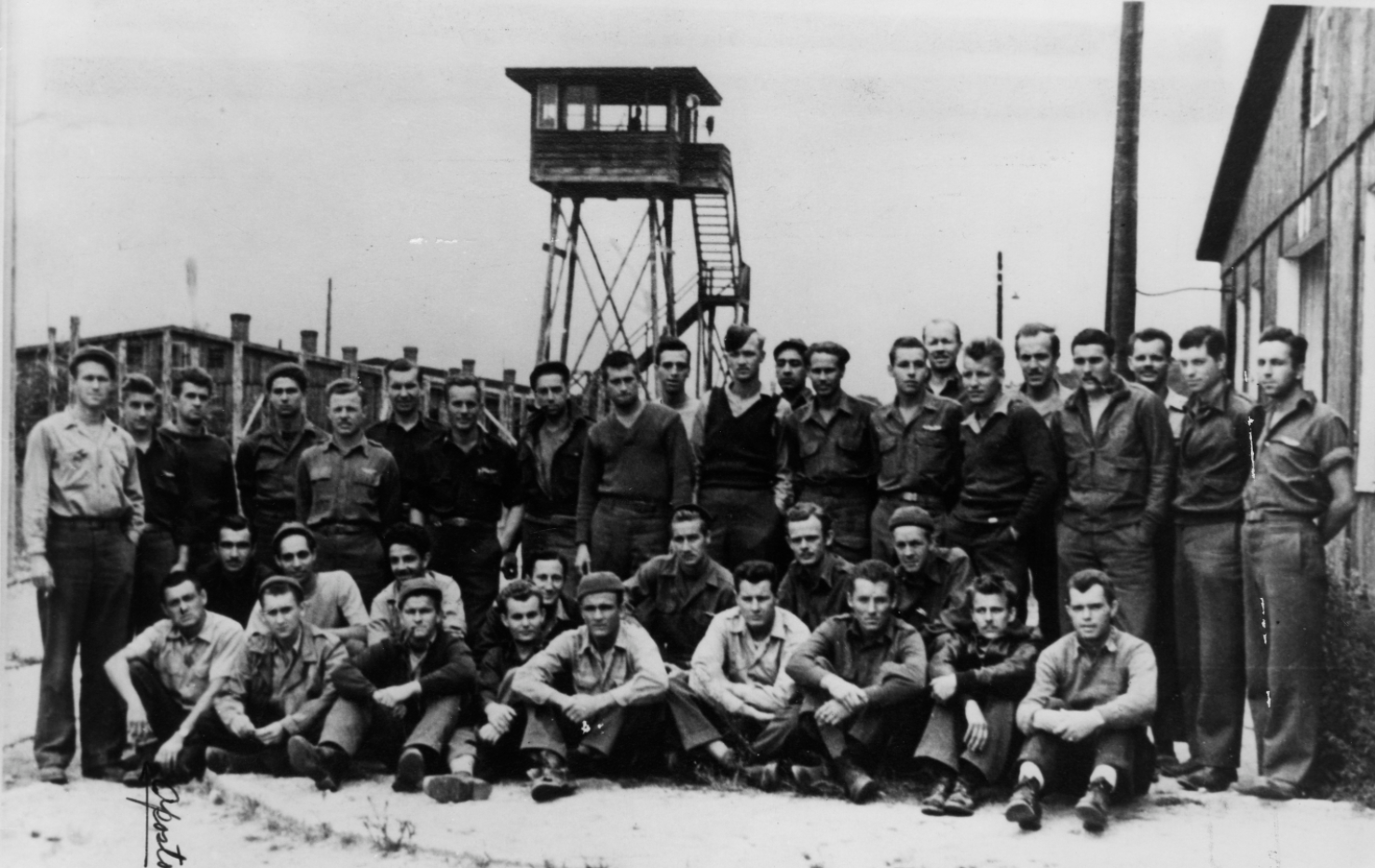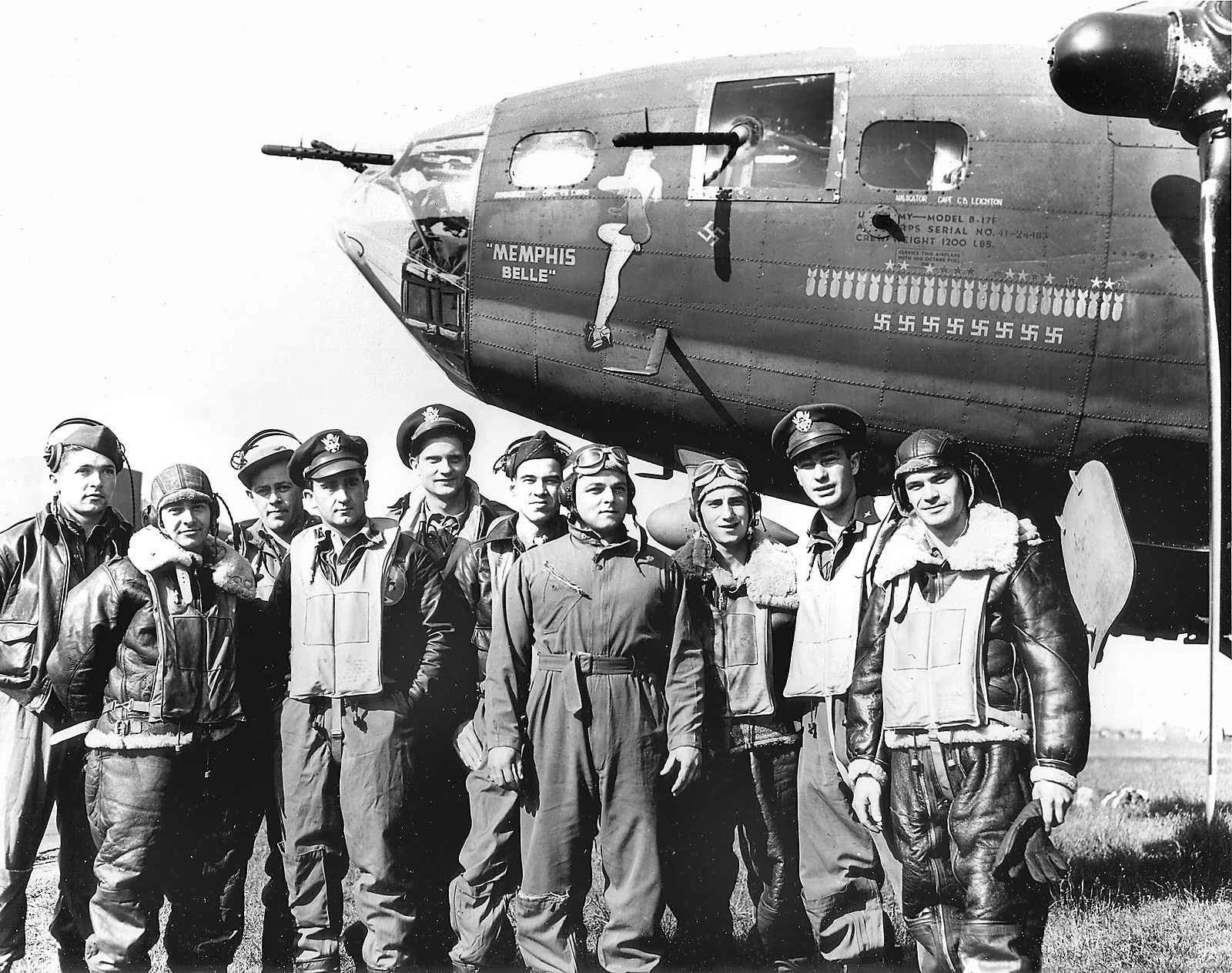Crew of the Memphis Belle. They are, left to right: Tech. Sgt. Harold P. Loch of Green Bay, Wis., top turret gunner; Staff Sgt. Cecil H. Scott of Altoona, Penn., ball turret gunner; Tech. Sgt. Robert J, Hanson of Walla Walla, Wash., radio operator; Capt. James A. Verinis, New Haven, Conn., co-pilot; Capt. Robert K. Morgan of Ashville, N. C., pilot; Capt. Charles B. Leighton of Lansing, Mich., navigator; Staff Sgt. John P. Quinlan of Yonkers, N. Y., tail gunner; Staff Sgt. Casimer A. Nastal of Detroit, Mich., waist gunner; Capt. Vincent B. Evans of Henderson, Texas, bombardier and Staff Sgt. Clarence E. Winchell of Oak Park, Ill., waist gunner.
Do we know what a “Hero” is anymore?
While researching The ATL-98 Carvair and Ultra-Large Aircraft books, I became intrigued with the stories of certain individuals whom fate chose for a particular task which they were not expecting. As I learned of the life of John Michael “Jack” Conroy, creator of the Super Guppy aircraft and founder of Aero Spacelines, I began thinking. During his life fate picked him for multiple tasks. The building of the Super Guppy came out of left field when he inquired about buying some surplus aircraft. Leo Mansdorf told him not to get in the airline business. Mansdorf had an idea to build a giant aircraft to transport rocket boosters for NASA. He showed a drawing to Conroy and asked, what do you think? Within days Conroy took on the project with little chance of succeeding but his perseverance paid off. Wernher von Braun stated that the guppies kept the space program on schedule. Does that make him a hero?
Jack Conroy truly lived a most incredible life. He was the first man to fly coast to coast and back in the same day. As great an achievement as that was or building the Super Guppy, it probably is not an act of heroism. It occurred to me later that he was actually a hero long before.
Conroy was the pilot of WW-II bomber Landa in England (379th Bomb Group). He was from the generation which produced a disproportionate amount of heroes. Some men are born at the right time in history. What motivates men to fly missions knowing that each time they take off 25 to 40 percent are not coming back? The sky was clear over Zeitz, Germany on 30 September 1944. They were expecting clouds for cover. As Jack Conroy started a bombing run on the synthetic oil refinery his B-17 took a hit in number one engine. Flak was everywhere, then a second engine was hit and the wing was on fire. Then the tail caught fire. Conroy told the crew to bail out. He and Milton Fox were the last to exit the burning aircraft. As they were falling toward the ground pieces of the aircraft were falling with them. Jack Conroy and his crew did not return from their 19th combat mission.
Crew of the Landa. Lt. Jack Conroy, pilot; Lt. Milton Fox, co-pilot; Lt. George McClellen, bombardier; Sgt. Jack Butterfield, tail gunner; SSgt. Elmer Evanson, waist gunner; TSgt Nathan Gershenbaum, radio operator; SSgt. Patrick Kelly, ball turret gunner; TSgt. Frank Neu, nose gunner; TSgt. Ernest Seeger, top turret gunner
How do you motivate men 19 times or 25 times in the case of the Memphis Belle crew to face death for the good of others? You can’t! It is an act of selflessness and true character— heroism.
Over the last few years, this has stuck in my thoughts. I have observed the decline of society and community values. I am not sure why, but have considered it is because we do not have “heroes” anymore. Today’s perceived heroes may have put a lifetime into their talent but have not committed an act of heroism.
Youth seem to idolize athletes and movie stars and certain celebrities who are famous because they are celebrities— not because they have done anything. How many times have you heard a child or young person say that a particular athlete or celebrity is their hero? It may be true they are talented or gifted champions in the profession. However, are they truly heroes?
Websters defines “hero” as a mythological or legendary figure often of divine descent endowed with great strength or ability. b : an illustrious warrior. c : a person admired for achievements and noble qualities. d : one who shows great courage.
If you ask Google to define a hero you get something like, “Heroes come in many forms in life, ranging from one’s family and friends to athletes to movie stars.” Really? Google makes my point!
Once again, I ask, is being a skilled athlete an act of heroism? Does dribbling a basketball with great skill constitute a hero?
I love Alabama football. The team is comprised of incredible talent. They are champions, but are they heroes? An act of heroism is when one performs an act of tremendous courage often putting their own life in jeopardy for the sake of another without regard for themselves. The military produces a larger percentage of heroes compared to the general population. In our everyday lives, police and firefighters perform the majority of heroic acts. Occasionally there is a motorist who stops along the highway to pull an injured person from a burning car. It is done in the moment without regard to their own safety. That is a once-in-a-lifetime act of heroism, while a soldier or police officer may commit multiple acts of heroism during their tour.
There is no harm in looking up to an athlete or celebrity for inspiration as a role model but not as a hero!
The World War II generation will soon all be gone. They made America great because they were willing to answer the call in large numbers. American society is rapidly forgetting their sacrifice and we have paid a price by admiring false heroes and accepting declining values. Mediocrity is now the norm.
I sum this up by asking you to look at this photo of the WW-II Memphis Belle crew (324th Bomb Squadron). Look at their faces. They are just young men and teenage boys from 19 to 26 and yet they are heroes. We can’t imagine what courage it took. The 8th Air Force attrition was so high that the Army capped a crew’s tour to 25 missions. These young men knew each time they took off that half the aircraft would be damaged and another 25 percent would not return, yet they did it willingly. That is courage beyond comprehension. This is heroism.
The Memphis Belle crew weren’t heroes just once, as when an individual steps forward in a single incident of bravery. Maybe they were chance heroes of fate the first time they flew a mission, but they did it 25 times in a row knowing the odds. Their courage combined with perseverance, talent, and random chance made them the first crew to survive 25 missions landing back in England on 17 May 1943, allowing them to go home.
On his 19th mission Jack Conroy was the last to bail out through the bottom of his burning aircraft. The slipstream slammed him into the bomb bay doors dislocating his shoulder and breaking his arm. He landed in a field along with his crew. They were soon captured by the Germans who offered no medical attention. Two of the crew members died shortly after. The Germans refused to treat Conroy. After several days a doctor set his broken arm popped his shoulder back in place. They remained POWs until they were liberated by Russian troops in May 1944 at the end of the war.
The WW-II U.S. Army 8th Air Force’s casualties were 47,483 out of 115,332. That is 40 percent. Over 26,000 men were lost. Initially, air crew losses were at nearly 86 percent. An additional 28,000 men became prisoners of war. Aircraft losses were an appalling 10,561 planes. If they survived 25 missions, they could return to the states. The brave men of the Eighth Air Force earned 17 Medals of Honor, 220 Distinguished Service Crosses, and 442,000 Air Medals.
Look at the Memphis Belle crew and the faces of these airmen in the POW camp photo. These heroes represents not only the 8th Air Force in WW-II but every American crew that serves and sees combat.
As Shakespeare says in Twelfth Night, “Be not afraid of greatness. Some are born great, some achieve greatness, and others have greatness thrust upon them.”
I fear we no longer aspire to greatness as individuals and as a country, not to be heroes but to make America and the human experience better. Heroism cannot be aspired to. Character is not created, it is revealed. The moment comes without warning. Hopefully there are still a few who will meet the challenge of Heroism.


I was fortunate enough to ride as co-pilot on a DC-3 that Jack was flying back to Santa Barbara after he purchased it in Midland, TX. It was my bad luck to have known none of his history before that flight. If I were to relive that flight, there would have been a million questions that I would have asked.
Thank you for sharing this story. I unfortunately did not have the opportunity to meet my grandpa Jack, but through reading stories such as this, I feel I get to know a piece of him. Thank you.